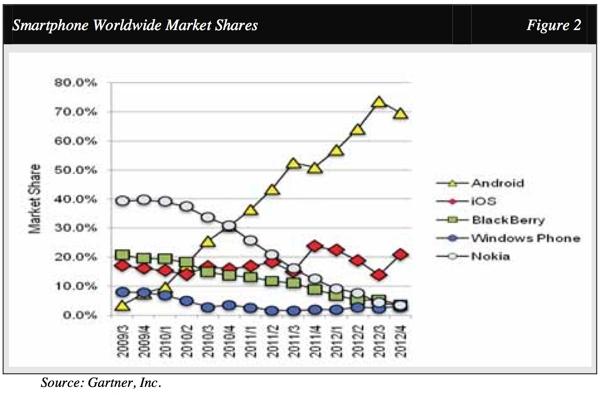A closer look at market shares in the highly competitive smartphone industry shows sales trends can be reversed in an instant, and companies that once dominated could quickly find themselves on the verge of collapse.
In the December quarter, Apple's iPhone captured 20.9 percent of the smartphone market, up from 13.9 percent in June. It was the launch of the iPhone 5 that caused Google's fast growing Android to reverse and actually lose market share at the end of 2012.
That led analyst Charlie Wolf of Needham & Company to ask on Monday why smartphone market shares can collapse with "such brutal speed." While Android has grown and dominated platform market share, only Apple has been able to hold its 20 percent share. Meanwhile, previously dominant platforms like BlackBerry, Nokia's Symbian and Microsoft's Windows Phone have become minor players.
The most important reason for these changes, Wolf believes, is the fact that carriers have "exceptional influence" on the phones customers buy. He said this strategy has worked particularly well for Android, because Google offers carriers and their retail staff incentives to push the brand.
"If the carrier decides to punish or simply ignore a brand, it can rapidly die, as we've seen in the case of BlackBerry and Nokia," Wolf wrote.
Another key factor in a sometimes chaotic market is the fact that many smartphone users replace their handset every year or two years. In comparison, PC owners typically keep their investment for four years, while TV sets last seven years or longer.
In addition to more opportunities for customers to switch brands, those brands are not "protected" when they are sold in carrier stores, where all products are essentially sold side by side. The only major vendor that has a means to prevent this is Apple, which sells iPhones through its own retail stores.
 Neil Hughes
Neil Hughes








 Charles Martin
Charles Martin

 Malcolm Owen
Malcolm Owen
 William Gallagher
William Gallagher

 Christine McKee
Christine McKee
 Wesley Hilliard
Wesley Hilliard








66 Comments
This is news!? Trotted off as insight?
I like this post because it reverses the trend as of late to post information about competitors that isn't disparaging.
And it's actually pretty subtle about what it says, so that's nice.
The most important reason for these changes, Wolf believes, is the fact that carriers have "exceptional influence" on the phones customers buy. He said this strategy has worked particularly well for Android, because Google offers carriers and their retail staff incentives to push the brand.
And so, uh, there's… not gonna be any sort of, uh… inquiry into this, is there?
So who's lying? The telecom employees who said they don't get anything for pushing Android or this guy who says they do?
I'd love to know more about this. Seems carrier employees do push Android on people that come in for iPhones quite a bit. I just figured they were fandroids, perhaps I assumed incorrectly ;p
That chart is scary looking. I think it is important to understand that a chart showing sales of iPhone verses Galaxy S(x) would look substantially different. Anyone who was considering an iPhone in comparison to an Android phone would perhaps consider the Galaxy S as the only other suitable choice.
The chart above is out of balance with all low end crappy Android devices not just the other premium device that could compete with iPhone.
ohhhh, beware apple shares could drop at any moment!!!.. . apple is doomed! i say! doooooommmmmmmed.. /Facetiousness ....and yes this Isn't news with respect to Apple, because Apple shares stay the same , unless of course you are stockbroker shorting the stock, to suck out some more wealth by making sure that the stock is around 400 dollars...